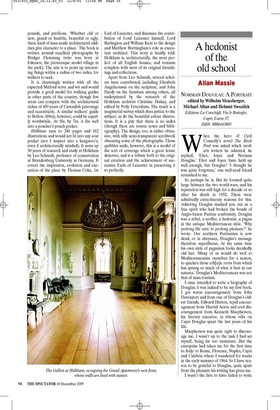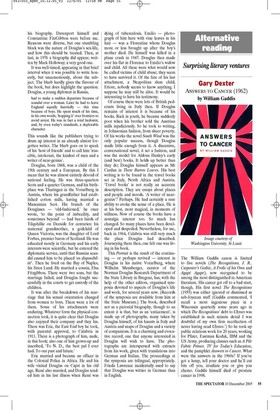A hedonist of the old school
Allan Massie
NORMAN DOUGLAS: A PORTRAIT edited by Wilhelm Meusberger, Michael Allan and Helmut Swozilek Edizione La Conchigli, Via le Botteghe, Capri, Euros 37, ISBN 8886443803 When the hero of Cyril Connolly’s novel The Rock Pool was asked which modern writers he admired, he replied, ‘Eliot, Joyce and Norman Douglas.’ Eliot and Joyce have held up well enough, but Douglas? ‘I thought he was quite forgotten,’ one well-read friend remarked to me.
So perhaps he is. But he loomed quite large between the two world wars, and his reputation was still high for a decade or so after his death in 1952. There were admittedly extra-literary reasons for this. Admiring Douglas marked you out as a free spirit who had broken the bonds of Anglo-Saxon Puritan conformity. Douglas was a rebel, a scoffer, a hedonist, a pagan in the antique Mediterranean style. ‘Why prolong life save to prolong pleasure?’ he wrote. Our northern Puritanism is now dead, or in abeyance, Douglas’s message therefore superfluous. At the same time his own style of paganism looks decidedly old hat: ‘Many of us would do well to Mediterraneanise ourselves for a season, to quicken those eth[n]ic roots from which has sprung so much of what it best in our natures.’ Douglas’s Mediterranean was not that of mass tourism.
I once intended to write a biography of Douglas; it was indeed to be my first book. I got warm encouragement from John Davenport and from one of Douglas’s oldest friends, Edward Hutton, tepid encouragement from Harold Acton and cool discouragement from Kenneth Macpherson, his literary executor, in whose villa on Capri Douglas spent the last years of his life.
Macpherson was quite right to discourage me. I wasn’t up to the task I had set myself, being far too immature. But the enterprise had taken me for the first time to Italy: to Rome, Florence, Naples, Capri and Calabria where I wandered for weeks in the early summer of 1964. So I have reason to be grateful to Douglas, quite apart from the pleasure his writing has given me.
I wasn’t the first to have failed to write his biography. Davenport himself and Constantine FitzGibbon were before me. Reasons were diverse, but one stumbling block was the nature of Douglas’s sex-life, and how this should be treated. Then, at last, in 1976 a biography did appear, written by Mark Holloway; a very good one.
It was well-timed, appearing in that brief interval when it was possible to write honestly, but uncensoriously, about the subject. The blurb hardly gives the flavour of the book, but does highlight the question. Douglas, a young diplomat in Russia,
had to make a sudden departure because of scandal over a woman. Later he had to leave England equally hurriedly — this time because of boys. He spent much of his time, in his own words, ‘hopping it’ over frontiers to avoid arrest. He was in fact a total hedonist, and, by even today’s standards, a deplorable character.
This sounds like the publishers trying to drum up interest in an already almost forgotten writer. The blurb goes on to speak of his ‘host of friends’ and to call him ‘irascible, intolerant, the kindest of men and a writer of near-genius’.
Douglas, born 1868, was a child of the 19th century and a European. By this I mean that he was almost entirely devoid of national feeling. He was three-quarters Scots and a quarter German, and his birthplace was Thuringen in the Vorarlberg in Austria, where his grandfather had established cotton mills, having married a Mancunian Scot. His branch of the Douglases — ‘old-fashioned,’ he once wrote, ‘to the point of imbecility, and sometimes beyond’ — had been lairds of Tilquhillie on Deeside for centuries; his maternal grandmother, a godchild of Queen Victoria, was the daughter of Lord Forbes, premier baron of Scotland. He was educated mostly in Germany and his early interests were scientific, but he entered the diplomatic service, until that Russian scandal caused him to be placed ‘en disponibilité’. Then he lived on the Bay of Naples, his Siren Land. He married a cousin, Elsa Fitzgibbon. There were two sons, but the marriage failed, and Douglas fought successfully in the courts to get custody of the children.
It was after the breakdown of his marriage that his sexual orientation changed from women to boys. There were a lot of them. Some of his attachments were enduring. Whatever form the physical connection took, it is quite clear that Douglas also enjoyed their company and they his. There was Eric, the East End boy he took, with parental approval, to Calabria in 1911. There is a photograph of him, nude, in this book; also one of him grown-up and inscribed, ‘To N. D., the best pal I ever had. To our past and future.’ Eric married and became an officer in the Colonial Police in Africa. He and his wife visited Douglas on Capri in his old age. René also married, and Douglas tended him in his last illness when René was dying of tuberculosis. Emilio — photograph of him here with vine leaves in his hair — was a Florentine whom Douglas more or less brought up after the boy’s mother died. He himself was killed in a plane crash in 1947. Douglas then made over his flat in Florence to Emilio’s widow and child. All these were what would now be called victims of child abuse; they seem to have survived it. Of the fate of his last attachment, a Neapolitan slum child, Ettore, nobody seems to know anything. I suppose he may still be alive. It would be interesting to have his testimony.
Of course there were lots of British pederasts living in Italy then. If Douglas remains of interest it is because of his books. Rich in youth, he became suddenly poor when his brother sold the Austrian mills injudiciously. So he took to writing, in Johnsonian fashion, from sheer poverty. Of his works the novel South Wind was the only popular success, though Douglas made little enough from it. A discursive, conversational novel, it set a fashion, and was the model for Aldous Huxley’s early (and best) books. It holds up better than they do; Douglas himself appears as Mr Cardan in These Barren Leaves. His best writing is to be found in the travel books set in Italy, North Africa and Austria. ‘Travel books’ is not really an accurate description. They are essays about places and people and moods. ‘A writer of neargenius’? Perhaps. He had certainly a rare ability to evoke the sense of a place. He is at his best, most magical, in moments of stillness. Now of course the books have a nostalgic interest too. So much has changed. So many places have been developed and despoiled. Nevertheless, for me, back in 1964, Calabria was still very much the place Douglas had described. Journeying there then, one felt one was living in his book.
This Portrait is the result of the continuing — or perhaps revived — interest in Douglas in his native Vorarlberg, where Wilhelm Meusberger, curator of the Norman Douglas Research Department of the State Library in Bregenz, has, with the help of the other editors, organised symposia devoted to aspects of Douglas’s life and work, for several years now. (Records of the symposia are available from him at the State Museum.) The book, described not as a pictorial biography, though to an extent it is that, but as an ‘enticement’, is made up of photographs, many taken by Douglas himself, of his haunts in Italy and Austria and snaps of Douglas and a variety of companions. It is a charming and evocative record, one that anyone interested in Douglas will wish to have. The photographs are interspersed with extracts from his work, given with translations into German and Italian. The proceedings at the symposia are trilingual, appropriately. Frieda Lawrence incidentally used to say that Douglas was wittier in German than in English.


























































 Previous page
Previous page